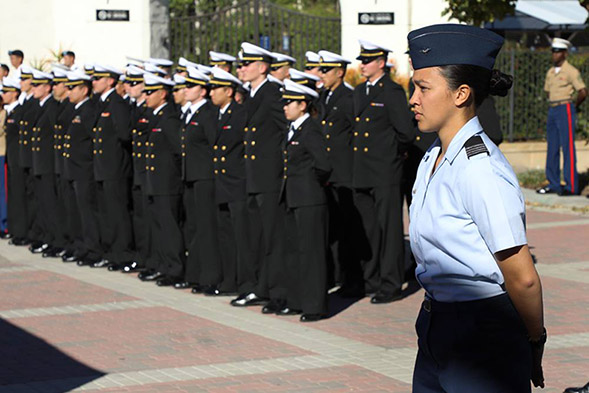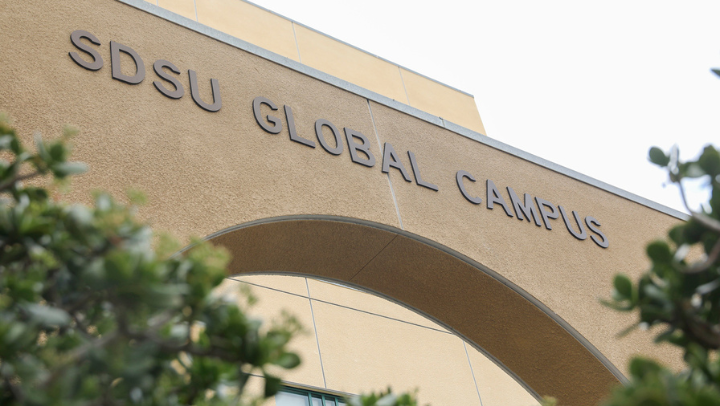Military Mentors
Military veterans are helping military-connected SDSU students find their purpose through the Aztec Mentor Program.

When Staci Reidinger (’14) retired as a major in 2017 after 24 years in the U.S. Marine Corps, she found she still had a need for a service component in her life. One of the ways she fills that need is by mentoring San Diego State University students through the Aztec Mentor Program (AMP).
“It’s important to me because serving others is a way to elevate society and give someone who maybe didn’t have a fair opportunity a chance to be successful,” she said. “You’re trying to help them reach their best potential.”
Making the transition from military service to a civilian career can be difficult. Reidinger, who now works at UPS Store corporate headquarters as director of public relations and social media marketing, has successfully made the transition, but empathizes with others who have trouble envisioning a satisfying post-military existence.
“A lot of people struggle after they leave service,” she said. “They don’t really know how to find the next mission, that next job that’s going to be purposeful.”
The purpose piece
It’s a feeling well-known to Derek Abbey, director of SDSU’s Joan and Art Barron Veterans Center, who oversees the university’s efforts on behalf of more than 1,000 student veterans. “The purpose piece” is what he calls the quandary often faced by veterans whose identity was largely defined by their military service.
“We see students all the time trying to figure out, ‘What will be my purpose now?” said Abbey, who retired as a major after 23 years in the Marine Corps. “Purpose is more than a paycheck.”
Mentors like Reidinger are needed to help student veterans find their purpose, to provide a road map of sorts to assist them in making the transition from a highly structured culture that speaks its own language to a civilian environment where professions have their own rules and jargons.
“They’ve learned how to be successful in a system that’s very different from the variety of systems existing in the public sector,” Abbey said of student veterans. “Learning to speak the language, learning to present yourself, learning to present the value that you bring to a different organization is a unique challenge for a number of our military members.”
Military connection
According to Abbey, in any given year there are between 4,000 and 5,000 military-connected students attending SDSU, including veterans, active duty military members, ROTC members, and family – often children and spouses – of military members.
During the 2018–19 academic year, AMP made 3,122 mentoring connections with 10.8% of mentors and 7% of students self-reported as having a military affiliation (active duty, veteran, or dependent).
Not all military-connected mentors are matched with military-connected students, and not all military-connected students choose to be matched with a military-connected mentor. Most students look for a mentor from a career field they hope to enter after graduation.
While there is no guarantee that military-connected mentors will be matched with military-connected students, “we like to encourage alumni with military backgrounds from all professions to be mentors with AMP,” said AMP Alumni and Career Development Coordinator Diane Marin. “For some of our student veterans, matching up with a military-connected mentor who shares their professional interests can be profoundly impactful.”
Still serving
Whether a student is a veteran looking to leverage a military background into a new career or a graduating job seeker looking for a way to literally move up the ranks, Reidinger touts the many advantages that may be gained through military service. Management experience, a competitive environment, upward mobility, and often international assignments are all things to be gained in the military that translate well to a civilian corporate environment.
“You won’t find a leadership opportunity at many other places like the military gives you,” Reidinger said. She urges other alumni who are veterans to become mentors and help students translate their military experiences into professional successes.
“For me, being a mentor is very satisfying,” she said. “It makes me feel like I’m continuing to serve our country even though I’m not doing it the same way I did in the military.”
Registration for students and mentors who are interested in participating in the program is open through Sept. 27.



